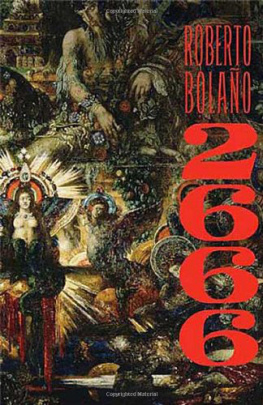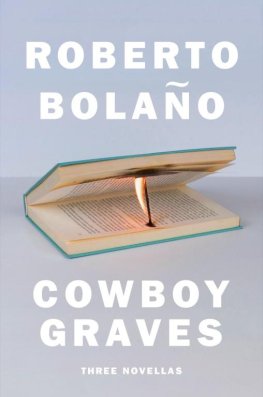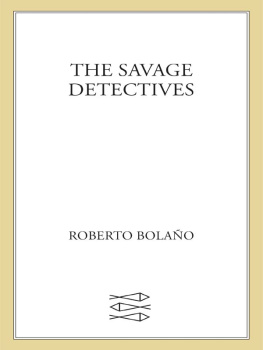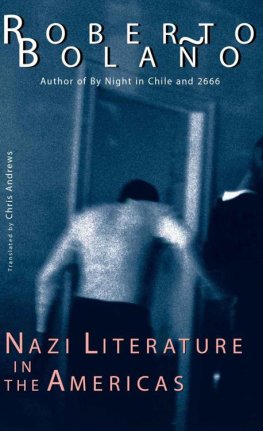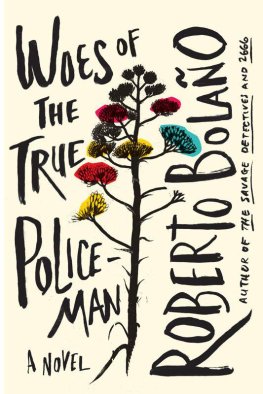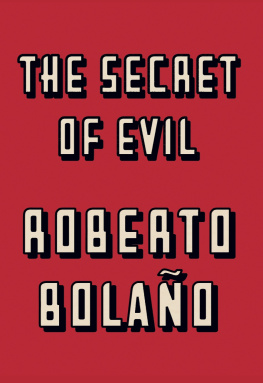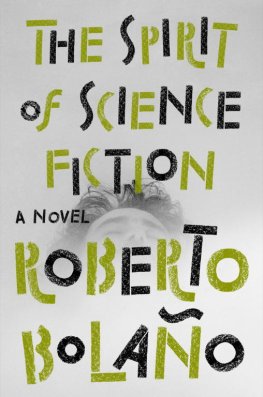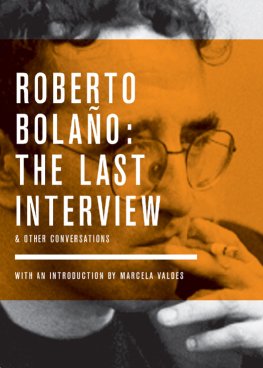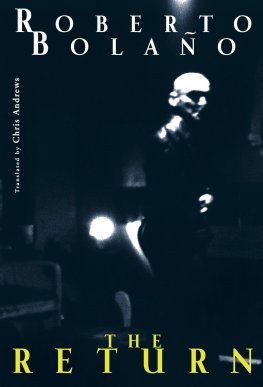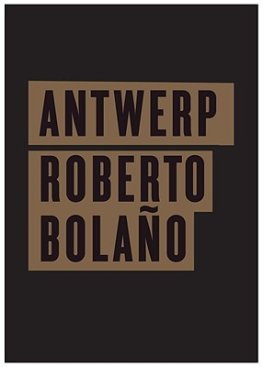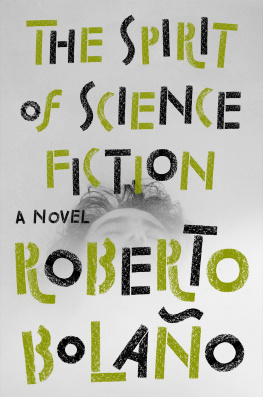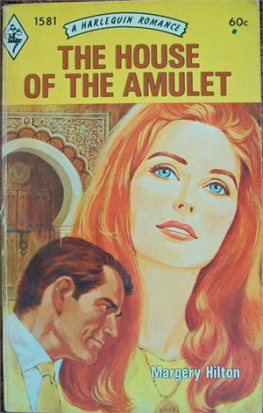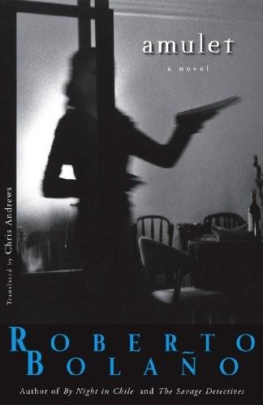
ROBERTO
BOLAO
A mulet
Translated from the Spanish by Chris Andrews
Copyright 1999 by the Heirs of Roberto Bolao Translation copyright 2006 by Chris Andrews
ISBN-13: 978-0-8112-1664-7
For Mario Santiago Papasquiaro (Mexico City, 1953-1998)
In our misery we wanted to scream for help, but there was no one there to come to our aid.
Petronius
One
This is going to be a horror story. A story o f murder, detection and horror. But it w on't appear to be, for the simple reason t hat I am the teller. Told by me, it won't s eem like that. Although, in fact, it's the story of a t errible crime.
I am a friend to all Mexicans. I could say I am the mother of Mexican poetry, but I better not.
I know all the poets and all the poets know me. So I could say it. I could say one mother of a zephyr is blowing down the centuries, but I better not. For example, I could say I knew Arturito Belano when h e was a shy seventeen-year-old who wrote plays and poems and couldn't hold his liquor, but in a sense it would be superfluous and I was taught (they taught me with a lash and with a rod of iron) to spurn all superfluities and tell a straightforward story.
What I can say is my name.
My name is Auxilio Lacouture and I am UruguayanI come from Montevideoalthough when I get nostalgic, when homesickness wells up and overwhelms me, I say I'm a Charra, which is more or less the same thing, though not exactly, and it confuses Mexicans and other Latin Americans too.
Anyway, the main thing is that one day I arrived in Mexico without really knowing why or how or when.
I came to Mexico City in 1967, or maybe it was 1965, or 1962. I've got no memory for dates anymore, or exactly where my wanderings took me; all I know is that I came to Mexico and never went back. Hold on, let me try to remember. Let me stretch time out like a plastic surgeon stretching the skin of a patient under anesthesia. Let me see. When I arrived in Mexico Len Felipe was still alivewhat a giant he was, a force of natureand Len Felipe died in 1968. When I arrived in
Mexico Pedro Garfias was still alivesuch a great, such a melancholy manand Don Pedro died in 1967, which means I must have arrived before 1967. So let's just assume I arrived in Mexico in 1965.
Yes, it must have been 1965 (although I could be mistaken, it certainly wouldn't be the first time) and day after day, hour after hour, I orbited around those two great Spaniards, those universal minds, moved by a poet's passion and the boundless devotion of an English nurse or of a little sister looking after her older brothers. Like me, they were wanderers, although for very different reasons; nobody drove me out of Montevideo; one day I simply decided to leave and go to Buenos Aires, and after a few months or maybe a year in Buenos Aires, I decided to keep traveling, because by then I already knew that Mexico was my destiny and I knew that Len Felipe was living in Mexico, and although I wasn't sure whether Don Pedro Garfias was living here too, deep down I think I could sense it. Maybe it was madness that impelled me to travel. It could have been madness. I used to say it was culture. Of course culture sometimes is, or involves, a kind of madness. Maybe it was a lack of love that impelled me to travel. Or an overwhelming abundance of love. Maybe it was madness.
If nothing else, this much is clear: I arrived in Mexico in 1965 and turned up at the apartments of Len Felipe and Pedro Garfias and said, Here I am, at your service. I guess they liked me: I'm not unlikeable; tiresome sometimes, but never unlike-able. The first thing I did was to find a broom and set about sweeping the floor of their apartments, and then I washed the windows, and, whenever I got the chance, I asked them for money and did their shopping. And they used to say to me, with that distinctive Spanish accent which they never lost, that prickly little music, as if they were circling the zs and the ss, which made the ss seem lonelier and more sensuous, Auxilio, they'd say, that's enough bustling around, Auxilio, leave those papers alone, woman, dust and literature have always gone together. And I would look at them and think, How right they are, dust and literature, from the beginning, and since at the time I was avid for detail, I conjured up wonderful and melancholy scenes, I imagined books sitting quietly on shelves and the dust of the world creeping into libraries, slowly, persistently, unstoppably, and then I came to understand that books are easy prey for dust (I understood this but refused to accept it), I saw whirlwinds, clouds of dust gathering over a plain somewhere deep in my memory, and the clouds advanced until they reached Mexico City, the clouds that had come from my own private plain, which belonged to everyone although many refused to admit it, and those clouds covered everything with dust, the books I had read and those I was planning to read, covered them irrevocably, there was nothing to be done: however heroic my efforts with broom and rag, the dust was never going to go away, since it was an integral part of the books, their way of living or of mimicking something like life.
That was what I saw. That was what I saw, seized by a tremor that only I could feel. Then I opened my eyes and the Mexican sky appeared. I'm in Mexico, I thought, with the tail end of that tremor still slithering through me. Here I am, I thought. And the memory of the dust vanished immediately. I saw the sky through a window. I saw the light of Mexico City shifting over the walls. I saw the Spanish poets and their shining books. And I said to them: Don Pedro, Len (how odd, I called the older and more venerable of the two simply by his first name, while the younger one was somehow more intimidating, and I couldn't help calling him Don Pedro!), let me take care of this, you get on with your work, you keep writing, don't mind me, just pretend I'm the invisible woman. And they would laugh, or rather Len Felipe would laugh, although to be honest it was hard to tell if he was laughing or clearing his throat or swearing, he was like a volcano, that man, while Don Pedro Garfias would look at me and then look away, and his gaze (that sad gaze of his) would settle on something, I don't know, a vase, or a shelf full of books (that melancholy gaze of his), and I would think: What's so special about that vase or the spines of those books he's gazing at, why are they filling him with such sadness? And sometimes, when he had left the room or stopped looking at me, I began to wonder and even went to look at the vase in question or the aforementioned books and came to the conclusion (a conclusion which, I hasten to add, I promptly rejected) that Hell or one of its secret doors was hidden there in those seemingly inoffensive objects. Sometimes Don Pedro would catch me looking at his vase or the spines of his books and he'd ask, What are you looking at, Auxilio, and I'd say, Huh? What? and I'd pretend to be dopey or miles away, but sometimes I'd come back with a question that might have seemed out of place, but was relevant, actually, if you thought about it. I'd say to him, Don Pedro, How long have you had this vase? Did someone give it to you? Does it mean something special to you? And he'd just stare at me, at a loss f or words. Or he'd say: It's only a vase. Or: No, it doesn't have any special meaning. That's when I should have asked him, So why are you looking at it as if it hid one of the doors to Hell? But I didn't. I'd just say: Aha, aha, which was a tic I'd picked up from someone, sometime during those first months, my first months in Mexico. But no matter how many ahas issued from my mouth, my brain went on working. And once, I can laugh about it now, once when I was alone in Pedrito Garfias's study, I started looking at the vase that had captured that sad gaze of his, and I thought: Maybe it's because he has no flowers, there are hardly ever any flowers here, and I approached the vase and examined it from various angles, and then (I was coming closer and closer, although in a roundabout way, tracing a more or less spiral path toward the object of my observation) I thought: I'm going to put my hand into the vase's dark mouth. That's what I thought. And I saw my hand move forward, away from my body, and rise and hover over the vase's dark mouth, approaching its enameled lip, at which point a little voice inside me said: Hey, Auxilio, what are you doing, you crazy woman, and that was what saved me, I think, because straight away my arm froze and my hand hung limp, like a dead ballerina's, a few inches from that Hell-mouth, and after that I don't know what happened to me, though I do know what could have happened and didn't.
Next page

